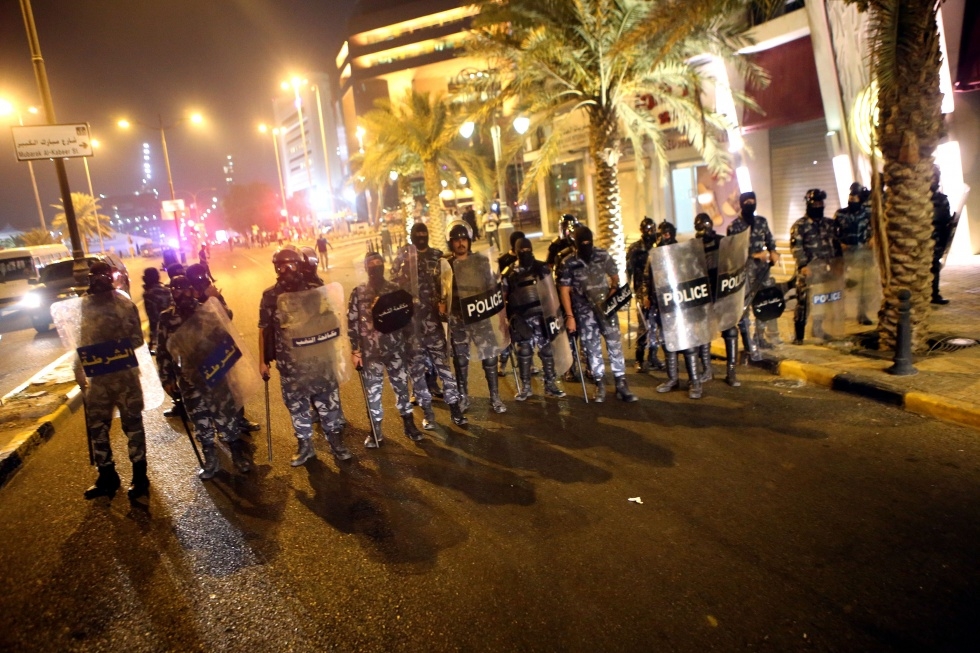Political tensions rise in Kuwait as opposition presses for change

Kuwait's opposition, a group of diverse ideologues, has ended almost a year of superficial calm and stepped up pressure for constitutional changes that could see the reshaping of the political structure in the Arab Peninsula's most democratic monarchy.
Marches held for several days in a row, starting 2 July, saw the participation of thousands of protesters, demanding the release of infamous opposition leader, Musallam al-Barrack. Tear gas bombs and stun grenades were fired by security forces to disperse the crowds, causing several injuries.
Even after the ex-MP was released, five days later, with charges of offending the judiciary, protests continued, along with the violence and the arrests, indicating that the crisis has not eased.
"The ongoing political movement did not start with Barrak's arrest in order for it to end with his release. It started long before that, in 2006, and has larger goals," Tarek al-Mutairi, head of the youth Civil Democratic Movement, told Middle East Eye.
Barrack had last month accused members of the ruling family, former senior officials and judges of being implicated in embezzling public funds worth multi-billion dollars. Hours after his release, he said more protests will take place.
"We will remain in squares and in marches until all of Kuwait takes to the streets and doesn’t return home before the fall of the corrupt and their trial," Barrak told his supporters.
"We have a long way ahead of us, and our movement won't stop until the elected government, headed by an elected premier, is achieved."
Parliamentary monarchy
Kuwait, one of the monarchies overlooking the Arabian Gulf, stands out for being semi-constitutional, with an elected 50-seat parliament that enjoys legislative powers.
However, the state's 52-year old constitution stipulates that only the ruler, who enjoys ultimate power, has the authority to appoint the prime minister, who is always a member of the ruling family. Key posts in the cabinet, including ministries of foreign affairs, defence and interior, are also held by members of the Sabah family.
This is something the grassroots opposition, and much of the young population - accounting for about 70 percent of the nearly 1.2 million Kuwaitis - is trying to achieve, as corruption has increased and popular laws have been blocked in parliament by the influential vote of the cabinet's 15 members.
"What we want is a constitutional monarchy, where a parliamentary government is formed from the ballot boxes based on partisan competition," explained Mutairi.
As it stands today, Kuwait's constitution does not permit the formation of parties, although political groups operate unofficially.
Although Kuwait, which is among the world's 20 highest income per capita, has escaped radical political alterations brought across the Middle East by the Arab Spring, it has had its own minor shockwaves.
Corruption scandals
The vicious opposition, enjoying the Gulf's widest margins of tolerance towards dissent, had won several spoils since it launched its quest in 2006. It first targeted the fall of Sheikh Nasser Mohammed al-Sabah, nephew of the ruler, Emir Sheikh Sabah al-Ahmed al-Sabah, who was just appointed as premier.
With significant representation in consecutive legislatures, many of Sheikh Nasser's ministers, including members of the Sabah family, were questioned at length before parliament, and some faced no-confidence votes, a practice alien to surrounding monarchies.
Repeated deadlocks between the opposition in parliament and Sheikh Nasser's cabinets resulted in nearly a dozen government resignations and the dissolution of at least four parliaments.
With massive support on the ground, manifested in large weekly rallies drawing thousands of protesters in 2011, Sheikh Nasser, who was described by the ruler as a "red-line," submitted his resignation on 28 November, 2011. It was the first resignation in the Gulf Cooperation Council (GCC) to be brought about by public pressure.
The move was propelled by a 2010 scandal, revealing the transfer of millions of dollars to the accounts of 15 lawmakers, who the opposition accused of receiving bribery to vote with the government.
Similarly, the recent return of the opposition to protesting after they last abandoned the streets almost a year ago, was prompted by two fresh scandals.
"In light of the allegations of corruption and payments within the ruling family, this was an opportune moment for the opposition to seize on an issue that they know they will receive support on. There is a lot of unhappiness within Kuwait about corruptive practices," Christian Koch, Director of the Geneva-based Gulf Centre, said.
In December, news broke out of video footage in which former government officials and Sabah members were purportedly plotting a coup. The public prosecutor, who investigates the case, has ordered a gag on the issue.
This was followed by Barrack's revelation in June, implicating the same officials of massive embezzlement and money laundering.
Opposition coalition
As tension built up, the emir, Sheikh Sabah, repeatedly affirmed that law will be applied to all those found guilty. In a speech on 27 June, he called on his people not to jeopardise stability by playing "games with politics."
Referring to unrest in nearby countries, Sheikh Sabah said in the televised speech "We do not have this luxury of differences and divisions, empty arguments and political games while catastrophes are right at our doorsteps."
"Now, more than ever, we need to close ranks and stand together to safely pass through these dangers which have swept and are sweeping those who are even stronger than us," said Sheikh Sabah.
Months after reports of the coup tape had surfaced, specifically in March, the opposition declared the formation of a unified front, the Opposition Coalition, with a set of 36 amendments it seeks to apply to the 183-article constitution.
"The coalition is a cross section of the society," Shafeeq Ghabra, political science professor at Kuwait University, said. "It consists of nationalists, liberals, leftists, Muslim Brotherhood, Salafists, trade and student unions, youth groups and more. All these groups see things differently, but there is a consensus towards reform, not revolution."
Mutairi added, "We have stayed away from ideological differences, such as the constitution's second article which pertains to the Muslim identity of the nation, and focused on political reforms on which we all agree."
But despite the effort to unite, differences "underneath the surface" might impose threats to the opposition's programme in the future, Koch says, adding it will be a "test" especially "if the government tries to bring one or the other group back" to its side.
Among these changes is the rescinding of a decree issued by the emir in 2012, to change the election law to a one-vote electoral system. Previously, each elector in the five constituencies had four votes. Deeming this a ploy to reduce their accessibility to the parliament after winning 35 seats in the assembly preceding the decree, opposition had since boycotted all legislative polls.
While Koch sees the boycott to have "backfired" against the opposition, which found itself "marginalised" and "curtailed their ability to be taken seriously or mobilise the public," Ghabra disagrees.
"The majority has no representation in the assembly, making it a weak house with no influence on the street. Meanwhile, the real power, finds its voice on the ground and is growing," he explained.
He gave an example of liberal Ali al-Rashed, a former lawmaker who supported the amiri decree and was elected speaker in the first house boycotted by the opposition. Rashed resigned in May, after parliament blocked a request to question the premier.
"Pro-reform sentiments are on the rise, and those who are pro-status quo are increasingly realising that the status quo will serve fewer and fewer people," Ghabra said.
Ruling family disputes
Mutairi confirmed that the opposition will reach its goals. "We are moving steadily towards the inevitable change demanded by the people, and any stalling is just to buy time," he said.
Koch said the opposition's success hinges on the "ruling family itself and whether splits within the Sabah family will allow the opposition to find further allies for their cause," adding that "disagreements within the family have opened the door for the opposition to regain their momentum".
Underlying political rivalry among some members of the Sabah family was mirrored in their vying for influence through buying up media platforms and forming alliances with the opposition, especially among the middle and younger generations of the family, as the subject of succession persists.
"If the family unites again, which is a possibility in the face of strong opposition power to curtail ruling family power, then the chances of impacting reform are lowered," Koch said.
Ghabra noted that the protesting of thousands of Kuwaitis, mostly accustomed to deluxe lifestyles, during the Muslim's fasting month and braving the summer heat is "proof of change in attitude."
"People are more assertive. It's no longer a leader and a follower. The follower has a meaningful desire for bigger political participation," he said.
Adding that the alternative to reaching a balance between the power of the ruling family and that of the opposition is "a slow bleeding of the Kuwaiti state," Ghabra said "the time for change was several years ago".
Stay informed with MEE's newsletters
Sign up to get the latest alerts, insights and analysis, starting with Turkey Unpacked
Middle East Eye delivers independent and unrivalled coverage and analysis of the Middle East, North Africa and beyond. To learn more about republishing this content and the associated fees, please fill out this form. More about MEE can be found here.




